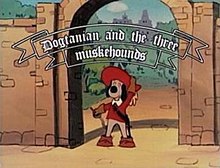This article needs additional citations for verification. (April 2018) |
| Dogtanian and the Three Muskehounds | |
|---|---|
 Title screen | |
| Spanish | D'Artacán y los Tres Mosqueperros |
| Kanji | ワンワン三銃士 |
| Revised Hepburn | Wan Wan Sanjuushi |
| Genre | Animation, action, comedy-drama, fantasy |
| Created by | Claudio Biern Boyd |
| Based on | The Three Musketeers by Alexandre Dumas |
| Written by |
|
| Directed by |
|
| Music by | Katsuhisa Hattori |
| Opening theme | Guido & Maurizio De Angelis |
| Country of origin |
|
| Original languages |
|
| No. of episodes | 26 (24 aired in Japan) |
| Production | |
| Executive producer | Claudio Biern Boyd |
| Producers |
|
| Production companies | |
| Original release | |
| Network | |
| Release | 9 October 1981 – 26 March 1982 |
| Related | |
| Infobox instructions (only shown in preview) | |
Dogtanian and the Three Muskehounds[a] is a Spanish-Japanese children's animated television series that adapts the classic 1844 Alexandre Dumas story of d'Artagnan and The Three Musketeers, produced by Spanish studio BRB Internacional with animation by Japanese studio Nippon Animation, that was first broadcast on MBS in Japan in 1981–82.[1]
Most of the characters in the series are anthropomorphizations of dogs, hence the title of the cartoon; although there are a few exceptions, most notably Dogtanian's two sidekicks Pip the mouse and Planchet the bear, among several others.[2][3]
In 1985, BRB Internacional released a television film edited from the series entitled Dogtanian: Special. In 1989, they produced with Televisión Española and Thames Television a sequel series entitled The Return of Dogtanian. In 1995, they released a television film edited from the sequel series entitled Dogtanian: One For All and All For One. In 2021, Apolo Films (BRB International's cinema studio) and Cosmos Maya released a feature-length CGI film entitled Dogtanian and the Three Muskehounds in cinemas.
Cite error: There are <ref group=lower-alpha> tags or {{efn}} templates on this page, but the references will not show without a {{reflist|group=lower-alpha}} template or {{notelist}} template (see the help page).
- ^ Vicedo Rovira, Andreu (2019). "They were one, two and three... Dogtanian and the Three Muskehounds" (PDF). BRB international co-productions in the 80s: From Ruy, the Little Cid to Around the World with Willy Fog (Bachelor thesis) (in Spanish). Polytechnic University of Valencia. Retrieved 12 December 2020.
- ^ De Semlyen, Phil; Plumb, Ali; O'hara, Helen; Dyer, James (9 October 2015). "Classic Kids' TV Shows That Still Rock Our World, Feature". Empireonline.com. Retrieved 27 September 2016.
- ^ "'I bought two dog encyclopedias': how we made Dogtanian and the Three Muskehounds". The Guardian. 5 July 2021.